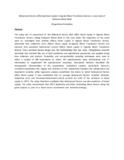Behavioural factors affecting blood supply in Uganda Blood Transfusion Service: a case study of Nakasero Blood Bank
Abstract
The study was an assessment of the behavioral factors that affect blood supply in Uganda Blood Transfusion Service , taking Nakasero Blood Bank as the case study. The objectives of the study were to; investigate how attitude affects blood supply in Uganda Blood Transfusion Service, determine how subjective norm affects blood supply in Uganda Blood Transfusion Service and examine how perceived behavioural control affects blood supply in Uganda Blood Transfusion Service. Cross sectional survey design was the methodology that was used. Triangulation research technique that involved the use of both qualitative and quantitative approaches was applied during data collection and analysis. Probability and non-probability sampling techniques were used to select a sample of 384 respondents to whom 367 questionnaires were administered and 17 interviewed to supplement the questionnaire responses. Descriptive statistics described the demographic characteristics of the respondents, Correlation analysis, particularly Pearson’s correlation established the degree and direction of the relationship between the independent and dependent variables while regression analysis established the extent to which behavioural factors affect blood supply. It was established that on average behavioural factors’ variables (Attitude, Subjective norm and Perceived behavioural control) account for 6.6% of the variations in blood supply in UBTS. The study therefore concluded that behavioural factors are vital predictors of blood supply. The study recommends that UBTS leadership prioritizes motivating blood donors along the given aspects as part of a blood donor recruitment and retention strategy.

